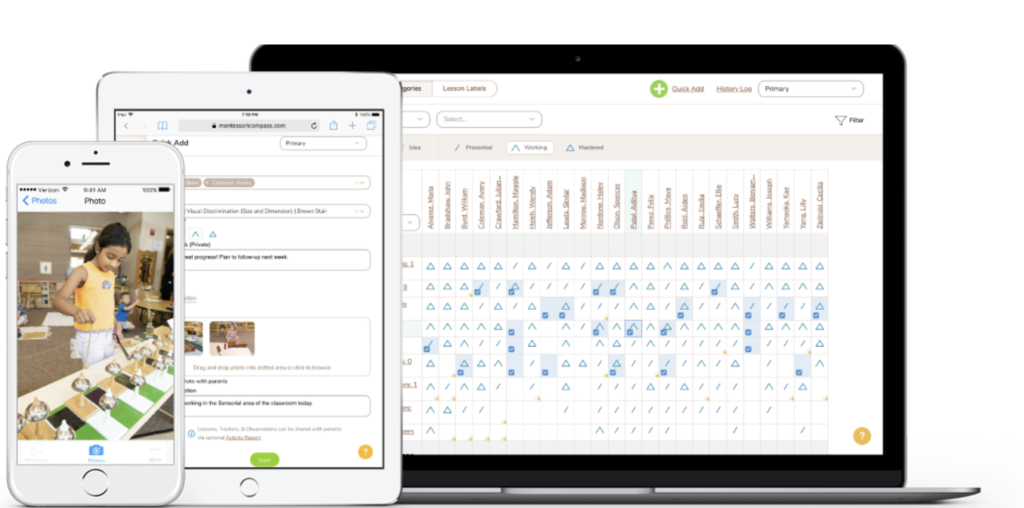Frequently Asked Parent Questions
Montessori emphasizes learning through all five senses, not just through listening, watching, or reading. Children in Montessori classes learn at their own, individual pace and according to their own choice of activities from hundreds of possibilities. Learning is an exciting process of discovery, leading to concentration, motivation, self-discipline, and a love of learning. Montessori classes place children in three year age groups (3-6, 6-9, 9-12, and so on) forming communities in which the older children spontaneously share their knowledge with the younger ones. Montessori represents an entirely different approach to education.
Yes; Montessori classrooms encourage deep learning of the concepts behind academic skills rather than rote practice of abstract techniques. The success of our students appears in the experiences of our alumni, who compete successfully with traditionally educated students in a variety of high schools and universities.
Research studies show that Montessori children are well-prepared for later life academically, socially, and emotionally. In addition to scoring well on standardized tests, Montessori children are ranked above average on such criteria as following directions, turning in work on time, listening attentively, using basic skills, showing responsibility, asking provocative questions, showing enthusiasm for learning, and adapting to new situations.
Montessori classrooms emphasize skills and dispositions that have been shown to have the greatest impact on success in later life: self-regulation, collaboration, conflict-resolution, and a variety of other executive skills aimed at continuous improvement. Students typically become comfortable with their strengths and learn how to address their weaknesses.
The emphasis in a Montessori class is on assisting and supporting children to develop and learn based on their own interests, desires, and timing. Attention is also paid to promoting collaborative social and educational relationships that enhance learning through shared ideas and insights. Thanks to the mixed age groups, children have the opportunity to be learners and teachers simultaneously. This allows a child to experience the joy of providing leadership to those who are younger and the satisfaction of receiving useful assistance from those who are older or more skilled.
Children who have been in a Montessori environment are generally very flexible and adjust quite easily to public school. They are usually better prepared to be good students and spend their time in productive ways because of their self direction and positive attitude towards learning.
Montessori is designed to help all children reach their fullest potential at their own unique pace. Because of the individual pacing, gifted students are much less likely to feel bored; they aren’t waiting for everyone in the room to “catch up” before s/he can learn something new. Similarly, students who may need more time with a lesson don’t feel pressured to “hurry up.” A classroom whose children have varying abilities is a community in which everyone learns from one another and everyone contributes. Moreover, multiage grouping allows each child to find his or her own pace without feeling “ahead” or “behind” in relation to peers.
The different arrangement of a Montessori classroom mirrors the methodology differences from conventional education. Rather than putting the teacher at the center of the class, with children dependent on her for information and activity, the classroom revolves around the needs, interests, and work of the children. Children work at tables or on floor mats where they can spread out their materials, and the teacher circulates about the room, giving lessons or resolving issues as they arise.
There are several different, yet integrated, areas of learning in a Montessori classroom: practical life skills, sensorial development, language, mathematics & cultural subjects (geometry, history, science, geography, art, music). In addition to the available materials in each area, children might also take time out during the day to sing songs, read a story, or enjoy nature.
Children have both individual and group lessons in each area. Throughout the day, children are free to work with the activities. Emphasis is placed on helping children choose pursuits that are of interest to them, thus supporting the child’s natural curiosity and desire to learn. At the elementary (6-12 years) level, you can also expect to see children working together on projects, since collaboration at this age helps the child to become socially adapted to society and aware of the needs of others.
What you won’t see in a genuine Montessori program are systems of rewards and punishments to promote work or control behavior. There will be no lost recess, gold stars, or grades. In a Montessori class, children are engaged, active, and respectful because they are internally motivated, spending their time in an environment that consistently supports development of their will—that is, positive willpower and self-control.
Dr. Montessori once told the story of a woman who visited her school and, without understanding Montessori principles, said to a child, “So, this is a place where you do what you like, is it not?” The child answered, “No, but we like what we do!” The child wasn’t running wild in the environment, as many people envision is true at Montessori schools. Rather, she was given an environment so rich with appropriate learning activities and gentle guidance that she enjoyed her education.
Montessori children are free to choose within limits, and have only as much freedom as they can handle with appropriate responsibility. The classroom teacher and assistant ensure that children do not interfere with each other, and that each child is progressing at her appropriate pace in all subjects.
It is the development of self-discipline that is encouraged and valued. By maintaining a carefully prepared, structured environment that encourages exploration, creativity, and choice within clear boundaries, the child learns self-control and problem-solving skills that foster independence and responsibility. In this setting, discipline is viewed as a maturation process that evolves, supported by guidance from the teacher. With gentle, prudent assistance, children eventually become comfortable and equipped to accept the consequences of their own behavior. Skilled teachers use Montessori materials and activities to promote a classroom atmosphere that reinforces personal discipline and harmony by offering each child the opportunity to gain a sense of direction, confidence, cooperation, and self-control.
There are no grades, or other forms of reward or punishment, subtle or overt. Assessment is by portfolio and the teacher’s observation and record keeping. The test of whether or not the system is working lies in the accomplishment and behavior of the children, their happiness, maturity, kindness, and love of learning and level of work.
Education of character is considered equally with academic education, children learning to take care of themselves, their environment, each other – cooking, cleaning, building, gardening, moving gracefully, speaking politely, being considerate and helpful, doing social work in the community, etc.
Children have a wide range of experiences, skills, abilities, and interests. A three-year age span in the classroom allows children the opportunity to use a wide range of engaging materials that keep them challenged to learn. As the child’s interests change, the range of available materials allows the child to move from one level of complexity to another. Additionally, younger children learn from the older children through example and older children gain confidence and affirmation of their knowledge by helping the younger children.
Before making an enrollment decision, you will tour the school during a “work cycle,” observing the teachers and students directly. In addition, your child will have a “shadow day,” allowing him or her to experience the environment first-hand. After the shadow day, the teacher will provide feedback regarding whether or not the program is a good fit for your child.

Staying Connected - Montessori Compass
So parents can be aware of their child’s daily learning and activities, we are utilizing a powerful software program called Montessori Compass. With this tool, parents can simply login to see the many details of the day, customized to reflect your individual child’s own experience. Parents will enjoy a tangible context for the question, “How was school today?”





Busy parents can simply access important school information in real-time from any computer
or web-enabled mobile device (i.e. iPhone, iPad, Android, etc.) Each parent website is
password-protected and personalized to contain only the information that is relevant to the
designated user’s family.
Parents rejoice - the MAC has an easy way to stay connected with your child’s school activities.

Activity Reports help answer the age old question for parents… what did my child do at school today?
This brief summary of the child’s day helps make family time even better as parents can engage their
children in a real conversation about their school day!
Like placing a sticky note in a child’s backpack on the way home from school 🙂

MAC makes it easy to share online photos of classroom activities. Photos are tagged to designated parent accounts,
so parents only see what is relevant to them. To protect privacy, only users with a school-authorized, password-protected
MAC account can access photos of classroom activity.
Online Classroom Photos
We know you LOVE to see photos of your children!

Even the most engaged parents can find it challenging to effectively understand their child’s progress in the Montessori classroom.
MAC makes it easy for parents to see tangible evidence of their child’s academic and social development in an easy-to-read format.
Online Montessori Progress Reports

Have you ever heard your child talk about Metal “Insects”? Parents choose a Montessori education for many reasons, but few truly
understand what the Montessori Method is all about. There is a learning curve with the unique terminology used in the Montessori classroom,
especially for new parents. MAC aims to help educate the parents alongside the child by sharing customizable photos & descriptions
of common Montessori works (i.e. it’s Metal Insets, not Insects!) Increased awareness of the many benefits of a Montessori education
leads to increased appreciation.
Montessori Materials Photos & Descriptions
Helping to turn Montessori Parents into Montessori Advocates!

